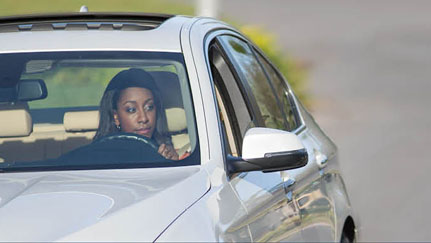
When you’re behind the wheel of a car — whether alone or with passengers — driving safely should always be your top concern.
We’re more distracted than ever, so it’s crucial to know the basics of safe driving and practice them every time you’re on the road. Nationwide Private Client recommends these safe driving tips:
Focus on driving
- Keep 100% of your attention on driving at all times – no multi-tasking.
- Don’t use your phone or any other electronic devices while driving.
- If you are using GPS on your phone, use a cell phone holder and input your destination and retrieve directions before you start driving.
- Slow down. Speeding gives you less time to react and increases the severity of an accident.
Drive defensively
- Be aware of what other drivers around you are doing, and expect the unexpected.
- Assume other motorists will do something crazy, and always be prepared to avoid it.
- Keep at least a 3-second cushion between you and the car in front of you.
- Make that at least 4 seconds when merging onto the freeway or if the weather is bad.
Make a safe driving plan
- Build time into your trip schedule to stop for food, rest breaks, phone calls or other business.
- Adjust your seat, mirrors and climate controls before putting the car in gear.
- Pull over to eat or drink.
- Bring maps and directions. If using GPS, input destination information prior to driving.
Practice safety
- Secure cargo that may move around while the vehicle is in motion.
- Don’t attempt to retrieve items that fall to the floor.
- Have items needed within easy reach – such as toll fees, toll cards and garage passes.
- Wear your seat belt and ensure all passengers are buckled up.
- Be cautious when taking pets in the car to avoid distracted driving and protect them from injury. We recommend using a well-ventilated carrier that has a secure door and latch, big enough for your pet to sit and lie down and that is secured to your car.¹
- Drive sober and drug-free.
More driving safety tips
- Avoid driving when you’re tired. Some medications cause drowsiness and make operating a vehicle very dangerous.
- Always use caution when changing lanes. Cutting in front of someone, changing lanes too fast or not using your signals may cause an accident or upset other drivers.
- Utilize the high-tech safety features that come with your car including blind spot indicators, backup cameras, distance alerts, and hands-free integration.
- Keep background music low so you can hear vehicle horns, emergency vehicles, etc.
- Don’t allow children to fight or climb around in your car – they should be buckled in their seats at all times. Too much noise can easily distract you from focus on the road.
- Avoid personal grooming while driving.
- Be extra careful while driving during deer season. Deer are most active during dusk and dawn and tend to travel in packs.
- Check all tires are at the recommended inflation psi.
If you have any questions, please contact your agent or Nationwide Private Client Risk Solutions professional. For more information on how you can help prevent losses, visit nationwide.com/solutionseries.
We offer this information to assist you in making decisions that can help mitigate your risk. While we cannot address every possible scenario or guarantee these tips will work for you, our goal is to support your efforts to protect yourself and your family.
[1] phz8.petinsurance.com/pet-health/pet-safety/pet-car-safety